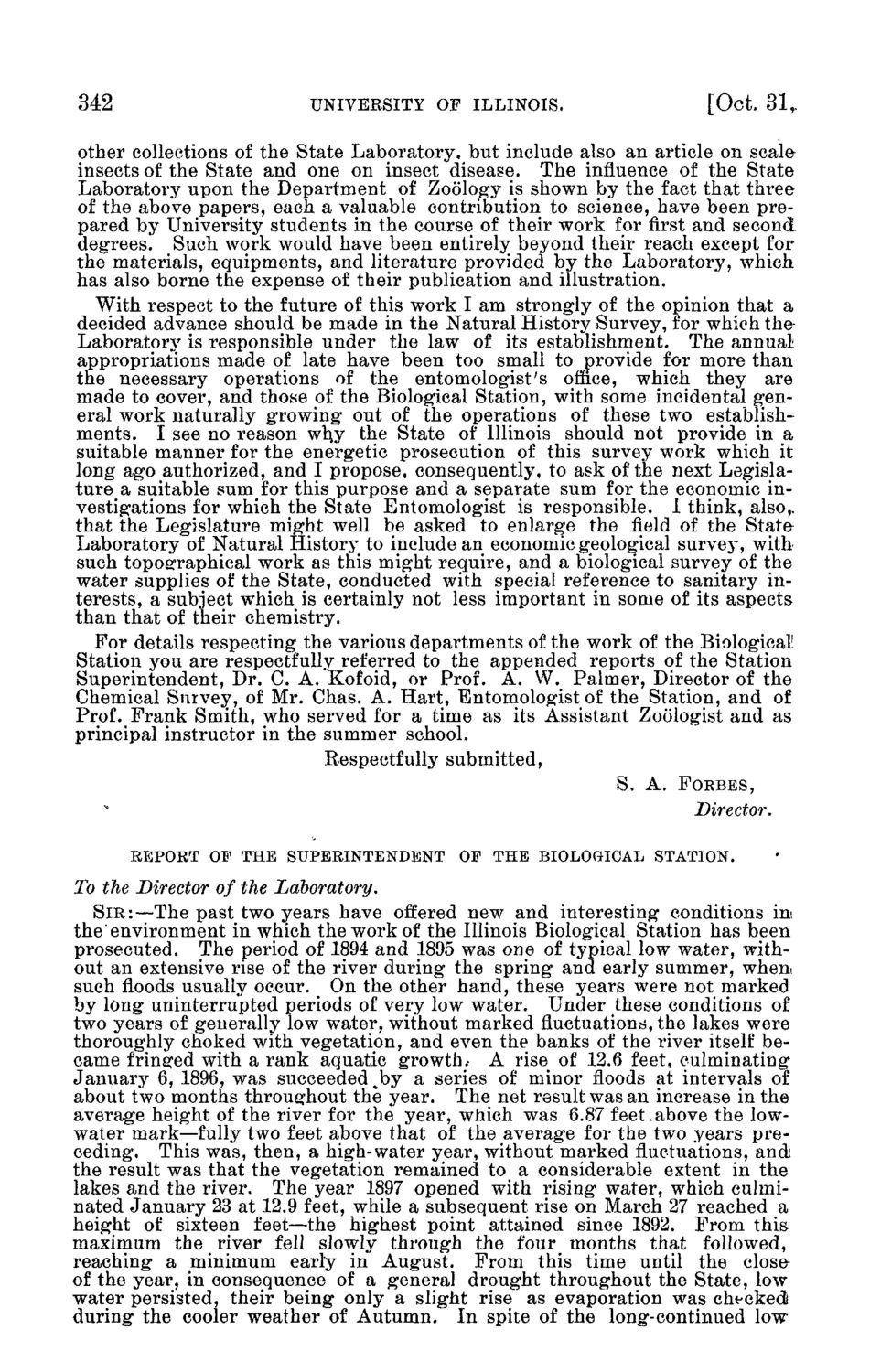| |
| |
Caption: Board of Trustees Minutes - 1898
This is a reduced-resolution page image for fast online browsing.

EXTRACTED TEXT FROM PAGE:
342 UNIVERSITY OF ILLINOIS. [Oct. 31,. other collections of the State Laboratory, but include also an article on scaleinsects of the State and one on insect disease. The influence of the State Laboratory upon the Department of Zoology is shown by the fact that three of the above papers, each a valuable contribution to science, have been prepared by University students in the course of their work for first and seconddegrees. Such work would have been entirely beyond their reach except for the materials, equipments, and literature provided by the Laboratory, which has also borne the expense of their publication and illustration. With respect to the future of this work I am strongly of the opinion that a decided advance should be made in the Natural History Survey, for which theLaboratory is responsible under the law of its establishment. The annual appropriations made of late have been too small to provide for more than the necessary operations of the entomologist's office, which they are made to cover, and those of the Biological Station, with some incidental general work naturally growing out of the operations of these two establishments. I see no reason wh.y the State of Illinois should not provide in a suitable manner for the energetic prosecution of this survey work which it long ago authorized, and I propose, consequently, to ask of the next Legislature a suitable sum for this purpose and a separate sum for the economic investigations for which the State Entomologist is responsible. 1 think, also,, that the Legislature might well be asked to enlarge the field of the State Laboratory of Natural History to include an economic geological survey, with such topographical work as this might require, and a biological survey of the water supplies of the State, conducted with special reference to sanitary interests, a subject which is certainly not less important in some of its aspects than that of their chemistry. For details respecting the various departments of the work of the Biological! Station you are respectfully referred to the appended reports of the Station Superintendent, Dr. C. A. Kofoid, or Prof. A. W. Palmer, Director of the Chemical Survey, of Mr. Chas. A. Hart, Entomologist of the Station, and of Prof. Frank Smith, who served for a time as its Assistant Zoologist and as principal instructor in the summer school. Respectfully submitted, S. A. FORBES, Director. REPORT OF THE SUPERINTENDENT OF THE BIOLOGICAL STATION. To the Director of the Laboratory. SIR:—The past two years have offered new and interesting conditions ins the environment in which the work of the Illinois Biological Station has been prosecuted. The period of 1894 and 1895 was one of typical low water, without an extensive rise of the river during the spring and early summer, whent such floods usually occur. On the other hand, these years were not marked by long uninterrupted periods of very low water. Under these conditions of two years of generally low water, without marked fluctuations, the lakes were thoroughly choked with vegetation, and even the banks of the river itself became fringed with a rank aquatic growth.- A rise of 12.6 feet, culminating January 6, 1896, was succeeded %by a series of minor floods at intervals of about two months throughout the year. The net result was an increase in the average height of the river for the year, which was 6.87 feet.above the lowwater mark—fully two feet above that of the average for the two years preceding. This was, then, a high-water year, without marked fluctuations, andi the result was that the vegetation remained to a considerable extent in the lakes and the river. The year 1897 opened with rising water, which culminated January 23 at 12.9 feet, while a subsequent rise on March 27 reached a height of sixteen feet—the highest point attained since 1892. From this maximum the river fell slowly through the four months that followed, reaching a minimum early in August. From this time until the closeof the year, in consequence of a general drought throughout the State, low water persisted, their being only a slight rise as evaporation was checked during the cooler weather of Autumn. In spite of the long-continued low
| |